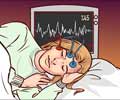
‘Smarter snacking can be cultivated by meeting sleep recommendations as less shut-eye is found to be linked to a higher intake of non-meal calories.’
Tweet it Now
The study analyzed 19,650 U.S. adults between the ages of 20 and 60 who had participated from 2007 to 2018 in the National Health and Nutrition Examination Survey to derive a link between not meeting sleep recommendations and eating more snack-related carbohydrates, added sugar, fats, and caffeine. Poor Sleep and Snacking
It was found that those people getting less sleep of recommended seven or more hours per night tend to eat more snack calories in a day overall. Moreover, it was found that popular American habit was not influenced by how much we sleep: snacking at night.
“At night, we’re drinking our calories and eating a lot of convenience foods. Not only are we not sleeping when we stay up late, but we’re doing all these obesity-related behaviors: lack of physical activity, increased screen time, food choices that we’re consuming as snacks and not as meals. Therefore, it creates this bigger impact of meeting or not meeting sleep recommendations. We know lack of sleep is linked to obesity from a broader scale, but it’s all these little behaviors that are anchored around how that happens,” says Christopher Taylor, professor of medical dietetics in the School of Health and Rehabilitation Sciences at The Ohio State University and senior author of the study.
The study thereby emphasizes the need for adequate night sleep to avoid poor snacking choices.
Advertisement
Source-Medindia













